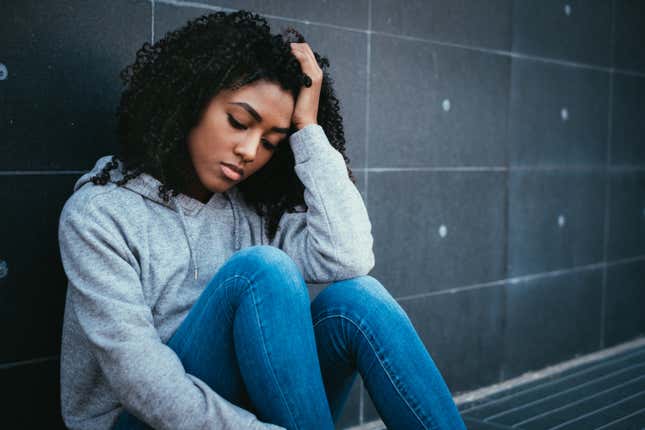
In the Spring of 1980, I was sitting on the roof of my college residence hall wondering why I couldn’t fit in and why I had so much pain – pain that couldn’t be seen. I still remember the view, the rooftops of other buildings against the moonlit sky and the edge of the roof beckoning me to move closer, softly saying “jump.” Thankfully, I resisted that call.
School officials and my parents agreed that the only way I could stay in college was to go into therapy. The college found a Black female therapist who would come to campus to hold our weekly sessions. The college actually did something: responded by providing on-site help.
The school’s swift action came in stark contrast to other times in my life when I had desperately needed support. In kindergarten, a teacher emotionally and physically abused me because I was late to school. My mother suspected something was going on when she saw her once-cheerful kindergartener who was eager to go to school become tearful and beg her daily not to go. One day, after drop-off, my mom decided to come into the school, only to see the white teacher shaking her Black child and repeatedly screaming, “Why can’t you be on time?”
The answer was simple: I was five years old, and I didn’t know how to tell time on a clock with hands. But the damage had been done. Among other things, I continue to struggle with intense anxiety attacks related to time pressures.
Years later, as a freshman in high school, I was at the birthday party of a boy I liked. As I was putting his present down with all the others, his mother pulled me aside and said, “You know, dear, you can never date my son.” When I looked perplexed by her statement, she went on to say, “Well, dear, you are Black, that is why.” Why was this woman having this conversation with a 14-year-old and not my parents, whom she knew? It seems it was okay for this white parent to think nothing of emotionally-scarring a Black child.
Nothing much has changed since I was a kid. Our Black children are regularly under the foothold of racism and oppression during the formative years of their lives. Like I did, they need culturally-aligned support when and where desired so that access is never a barrier. Even though my experiences are years in the past, I talk to Black youth, young adults, and parents daily who share experiences of trauma and harm that constantly eat away at their mental health.
I’ve thought about this a lot in recent days, after the Center for Disease Control (CDC) published its latest report on suicide. The report cites a whopping 36.6 percent increase in rates among Black persons aged 10–24 years, from 8.2% in 2018 to 11.2% in 2021. Further, in its conclusion, CDC states: “Significant increases among young Black persons aged 10–24 years and across multiple racial and ethnic populations aged 25–44 years raise particular concern.”
Yes, it sure is concerning.
I see myself in those statistics – as a survivor of all they represent. As a person with lived experience of a mental health condition, a suicide attempt survivor who is Black, and as a mental health advocate, I know all too well what this information means and why we can and must address this issue.
What we need now is political will.
Rep. Bonnie Watson Coleman (D-NJ) introduced the Pursuing Equity in Mental Health Act in the last Congress, which is the first comprehensive federal legislation to address increasing suicide rates and mental health disorders among Black youth. The bill would have provided grants for culturally appropriate mental health services in schools and community settings; increased funding for research into mental health disparities in youth of color; boosted support for diversifying the behavioral health workforce; and established a commission to examine the effects of smartphones and social media on adolescent mental health.
The latest CDC data underlines the urgency of this critical legislation and echoes warnings we’ve been hearing for years. From the Surgeon General, who sounded the alarm about youth mental health in 2021, to the nation’s leading pediatric groups which deemed the youth mental health crisis a “national emergency” that same year, to even President Biden laying out a national mental health strategy to address the issue – the problem couldn’t be more clear. Yet still, the Pursuing Equity in Mental Health Act never made it to the floor of the Senate for a vote.
It is time for our country to take seriously the urgent need to focus on Black youth mental health.
Although I gave up many times, I am grateful that I know now that our lives matter. When I was at my darkest and thought I would give up on life, I had a therapist who would say, “I will hold the hope for you.” We must not continue to fail our Black young people. Instead, it is time for us to say to them: “Now, we will hold the hope for you.”
Keris Jän Myrick serves as the Vice President of Partnerships at the national mental health nonprofit Inseparable.



